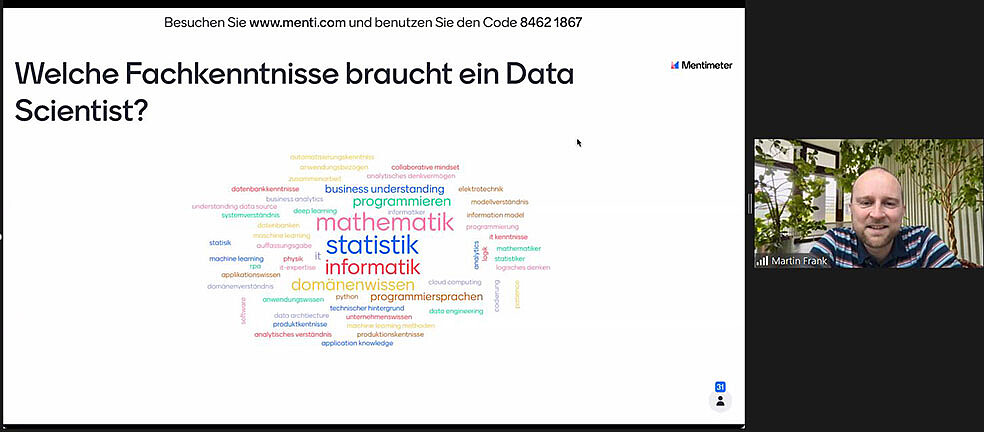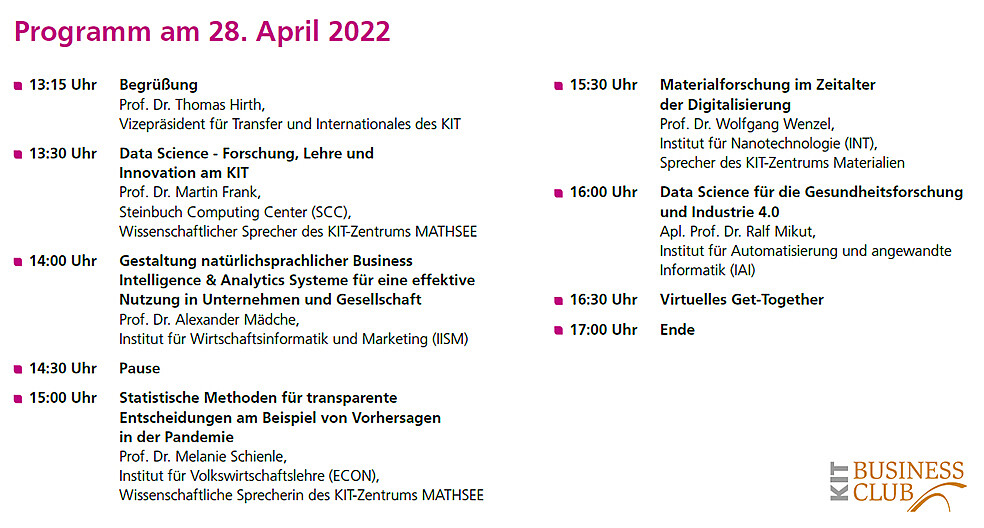Published on June 23, 2022
Dialogue at the Theme Day: Data Science at KIT

Extracting knowledge from data – but how? The theme day "Data Science at KIT - creating knowledge from data" of the KIT Business Club on April 28 under the patronage of Prof. Thomas Hirth, Vice President for Transfer and International Affairs of KIT, revolved around this challenge. The answers to the question were diverse and offered the opportunity for a discourse from very different perspectives in the digital plenum and small breakout sessions.
What is Data Science and why now?
Data Science, which translates to Datenwissenschaft in German, generally refers to the extraction of knowledge from data. The prerequisites for the use of data-based approaches in very different application scenarios are already in place: On the one hand, larger volumes of data are often available, e.g., due to the increasing proliferation of sensors, greater networking in the Internet of Things, and the progress of digitization. On the other hand, higher computing capacities and cloud solutions make it increasingly possible to manage this immense avalanche of data and extract insights from it. Data science has a key role to play in developing and providing suitable tools and data models for this purpose. This is one of the reasons why big data (and its use) is now seen as a further pillar of scientific knowledge, alongside the triad of theory, experiment and model.
In which fields is Data Science involved at KIT?
From the event’s beginning, Prof. Martin Frank from the KIT Center MATHSEE pointed out that data-based research has long since found its way into many different disciplines at KIT and is an important instrument for the precise and efficient clarification of current and future questions. The fact that data science usually has to act in an interdisciplinary way and has to incorporate knowledge about the application domain was also shown by the impulse contributions at the theme day, which presented exemplary applications from different disciplines.
- The focus of the presentation by Prof. Alexander Mädche (Institute for Information Systems and Marketing (IISM)) was on future communication between humans and machines using the example of conversational dashboards, dashboards you can talk to. He is convinced that multimodal communication will soon have a strong impact on the working world, but that its efficient use requires proper support and training.
- Prof. Melanie Schienle (Institute of Economics (ECON)) impressively described the possibilities offered by collaborative approaches to data analysis for forecasting. In her contribution on short-term forecasts in the context of the Covid 19 pandemic, she showed that the use of whole ensembles of different statistical approaches can significantly improve the quality of forecasts.
- Prof. Wolfgang Wenzel (Institute of Nanotechnology (INT)) presented the manifold activities at KIT on Data Science in Materials Science. In addition to concrete individual examples from material optimization, the use and accessibility of distributed material or experimental data within the framework of platforms such as Material Digital is of particular importance in this context.
- The examples of applied machine learning by Prof. Ralf Mikut (Institute of Automation and Applied Informatics (IAI)) came from very different fields of application, such as Life Science and Industry 4.0. He showed that the basic data science approach works similarly in each case, but that domain-specific knowledge is crucial for a meaningful use of the technology.
Which challenges and choices are present for the companies?
Guests from industry expect a lot from data science event. On the one hand, increasingly available big data offers huge potential for faster development cycles, new business models and more. Currently, 90% or more of the data generated still remains unused! On the other hand, leveraging this enormous potential is costly. Providing the appropriate technical infrastructures and the necessary personnel capacities could increasingly require the commitment of state actors. Companies see concrete deficits for the effective use of data science, for example, in the quality, structure and uniformity of data sets, in the organization of data use in the given corporate structures, but also in the identification of economically interesting business models based on data. In addition, of course, the ethical social aspects of digitization, such as splitting society, should not be neglected.
People with technical and interdisciplinary expertise play a key role here. The demanded specialists are scarce, the "war for talents" in this field is in full swing and will continue to intensify. A common finding: stronger and more tailored training on the part of educational institutions is important to counter this shortage of experts. An impulse that Prof. Frank will also take up in the planning of the Graduate School for Computational and Data Science at KIT.



comments about this article
No Comments